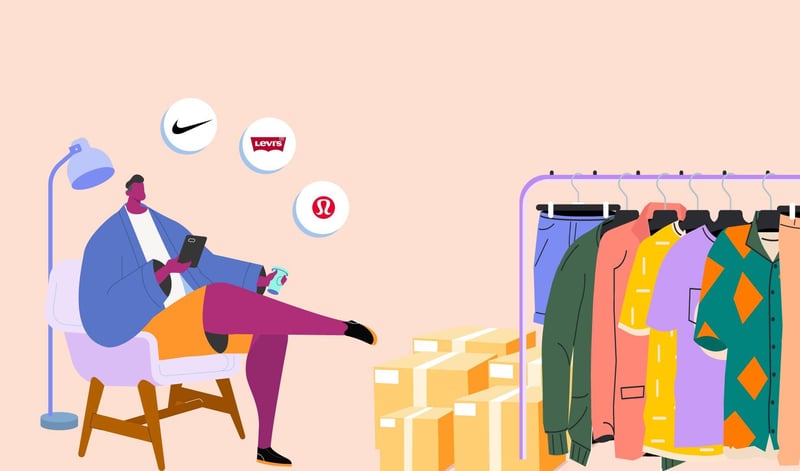The crossover between retail and resale took off in 2021 and has expanded rapidly as top brands such as Levi’s, Patagonia, Lululemon and more prioritize sustainability and the mark they want to leave on the circular economy.
According to the latest resale report from Vestiaire Collective and Boston Consulting Group (BCG), the resale market is now worth $100-120 billion, three times more than in 2019. It is predicted that the industry will reach $367 billion by 2029, according to the Thredup Resale Report. So what does this mean for consumers and for the fashion industry on a global scale? Let’s dive in.
New, Secondhand, or Both?
At first, labels such as Stella McCartney and Patagonia were amongst only a few brands taking an early interest in sustainability while others were hesitant to adopt a business model that supported it.
However, over the last few years consumers have brought the issue of climate change to the front door of major brands. With Fashion being one of the top contributors to global carbon emissions, sustainability has become a top priority and brands are listening to how responsible they are for the environmental impact of their business. From a retailer's perspective, sustainability means creating, manufacturing, and selling environmentally friendly products.
New business models such as renting or buying secondhand apparel are emerging as more environmentally and socially conscious consumers explore these options.
Dozens of brands such as Madewell (who partnered with ThredUp for Madewell Forever), Farfetch, Levis, Lululemon and many more have jumped on the bandwagon launching their own resale programs as demand increased and investment money came pouring in from heavy hitters such as Kering and Softbank. Even fashion houses such as Gucci have joined in, partnering with The RealReal in 2020, a luxury consignment marketplace.
Nike
Nike started its Refurbished Program “extending the life of eligible products by taking like-new, gently worn, and slightly imperfect kicks, refurbishing them by hand, and offering them to you at select Nike Factory, Nike Unite, and Nike Community stores.” This addition to such an iconic brand's business model is a huge indication of how consumers are changing the way they shop and what they consider when making a purchase.
Levis
Another brand also investing heavily in the resale market having launched Levi's SecondHand. On Levi's SecondHand, Levi's sells previously owned Levi's jeans and jackets. Levis partnered with Trove who will be the party responsible for managing deliveries, washing garments, fulfilling orders, and taking pictures of merchandise to be displayed online. The brand is transparent with its consumers on their mission with this initiative here, stating they want “SecondHand to be Second Nature” for fans.
Lululemon
The activewear leader launched Lululemon Like New so consumers could shop gently used items such as their infamous leggings, coats and jackets for both Men and Women.
In summary, brands aren’t nixing producing new clothing as they always have, but asking and answering the question, how can we be better?
Competition
Beyond the brands themselves, over the last decade platforms dedicated to secondhand and sustainable fashion have made waves in the industry, providing a whole new way to shop and give multiple lives to pieces of clothing, sneakers, accessories and more.
The RealReal
TRR is a consignment marketplace for staff-authenticated designer and luxury goods. The RealReal sells consigned mens and womens contemporary, luxury and marquee clothing, fine jewelry, watches, shoes, handbags and upscale home decor. TRR will sell your items for you, in exchange for a fee, and pay you the rest of the sale price.
They are considered the leader in luxury consignment and have had notable partnerships with Gucci, Stella McCartnery and Jimmy Choo. The RealReal has even launched an upcycling program and created four of their own in-house collections called ReCollection where a designer takes unsellable clothing and accessories and turns them into something new. Per The RealReal it is “A tribute to craft and mending that reimagines the unwearable into something one of a kind.”
Vestiaire Collective
Similar to The RealReal, sustainable shopping is made easy with Vestiaire Collective. Shoppers will find luxury pre-loved fashion that is authenticated by experts.
The marketplace offers almost every item category for men and women including bags, shoes, clothing, accessories and even has a children's section. With over 10,000 brands to choose from, visitors are bound to find an item they love but don't want to pay full price for.
Fun Fact: Vendoo will soon be integrating Vestiaire Collective as a marketplace! Users will be able to crosslist items to the platform, tapping into an extensive audience. Stay tuned for more details.
StockX
Watches, apparel, sneakers, and handbags are available online at Stock X. The site offers real-time market data for intelligent buying and selling, rare collectibles, and daily new products. StockX offers a bid/ask process where your item can be listed with a designated price set by the seller and potential buyers can accept your listing price or place a bid. If that amount is acceptable to a seller, sellers can approve the bid and sell their item for that amount.
Once a deal is agreed upon, StockX will email a shipping label so the seller can send their product to them to be verified. The service typically gives you two business days to ship your item, or else there will be a fee taken out of your price.
Sellers are incentivized to sell more with fees decreasing the more they sell. It’s also easy to list your items to sell with competitive pricing since StockX has an extensive database of how much items have sold for based on style and size.
You might also like: 5 Best Marketplaces for Sneaker Resellers
Goat
Goat is a global platform for the hottest products from the past, present and future. You can shop new releases and iconic sneakers and apparel from the world's leading brands. To list an item on GOAT you’ll need to apply for a seller's account and be approved.
Once you are an authorized seller you can proceed to list your sneakers and other items on the platform. If you make a sale you’ll ship your item to GOAT to be inspected and authenticated. GOAT will ship the item to the buyer and funds will be deposited into your account. The process is seller-friendly, being quick and easy and all done through your phone. Sneakers are also given more market exposure by being cross-listed on Flight Club.
Grailed
Shoppers will Find high-quality men's and women's streetwear & designer pieces from the brands they love. It’s a community marketplace for both men's and women's fashion.
Grailed is a beloved secondhand marketplace because it offers a wide range of coveted items. From a sellers perspective Grailed provides a low barrier to entry since there are no restrictions on style or condition (severity of wear). Sellers can edit their listings at any time and fees are on the low side in comparison to other marketplaces.
Want to resell on multiple platforms? Check out 10 Great Marketplaces Every Reseller Should Consider
Fast Fashion Creates Resale Programs, But is it Sustainable?
Zara, Shein and Pretty Little Thing (PLT) are fast fashion giants, but even they can’t escape how their production model is contributing to the planet's climate crisis. The jury is still out on whether their efforts will offset their carbon footprint and experts are saying it's closer to greenwashing than it is sustainability.
Zara launched Zara Pre-Owned on November 3rd, exclusive to the UK thus far. It’s been marketed as a peer-to-peer platform that will push consumers to make more sustainable decisions when shopping. Repairs and donation options will also be available.
Shein has also launched a peer-to-peer resale program in the U.S. called Shein Exchange, in an effort to encourage users to purchase and sell previously-owned Shein apparel. The program is aimed to create a simple resale process so sellers can easily list items on their platform. While only available in the U.S. it plans to expand the program globally in the future. Users can access Shein Exchange by downloading their app.
A seller would list their Shein item and once a buyer purchases and a Shein Exchange team member approves the listing the item can be shipped. The ramp up to their U.S. distribution infrastructure and the resale program comes at a timely manner considering there has been great speculation around a possible IPO in New York.
The retailer has commented saying the Shein Exchange program is part of the company’s “larger commitment to address the ongoing issues of textile waste and build a future of fashion that is more circular.”
However, how incentivized will shoppers be to list clothing that already comes as a super low price brand new? Based on a user's previous purchases they will be able to list those items for sale on Shein Exchange through the app.
Shein will sometimes set a maximum price that sellers can ask for an item and sellers will pay Shein 5% of that price. Between the extremely low start prices and shipping, we’re curious to see how this model plays out with consumers and the overall market.
In an attempt to shed its reputation as a disposable fashion retailer, BooHoo Group brand PrettyLittleThing launched a Depop-style marketplace this year. In the past, the company has been harshly criticized for its role in disposable fashion.
According to European creative director Molly-Mae Hague this resale program will allow customers to sell products from PLT and any other brand. PrettyLittleThing customers can access the PLT MarketPlace from their existing PLT orders in the app and easily upload their old PLT wardrobe straight onto the selling platform. Currently only available in the UK the brand plans to expand to other markets by the end of the year.
In conclusion, it’s clear to see the fashion industry, both brands and marketplaces alike, know they must take a step toward sustainability and the circular economy to stay relevant with smart shoppers. Consumer behavior shows that people care more now than ever before how their purchases affect the well-being of our planet and are making informed decisions about the pieces they purchase with longevity in mind.
Share your thoughts with us on big brands taking on responsibility through resale programs!







